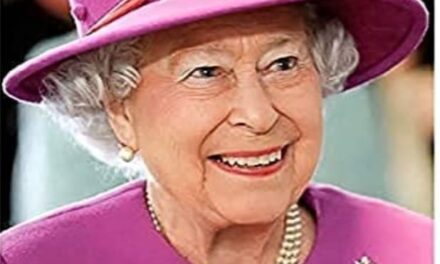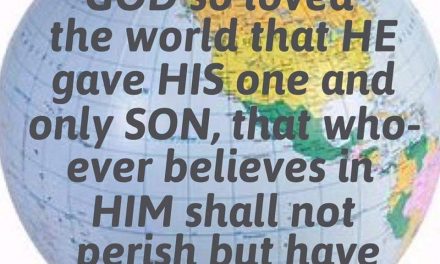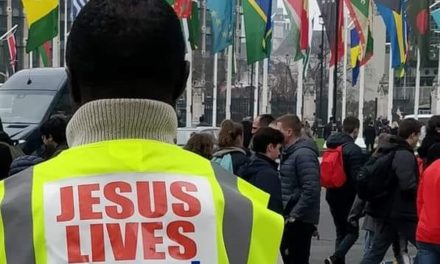The Gospel reading from Mark 10 serves as the third part of the question on divorce, the visit of the little children, and the “rich young ruler” (vs 17-31). The Gospel reminds us that the exclusive and ONLY way to salvation is beyond compliance with the social works or demands of the law. The reflection is that, the biblical basis of Christian stewardship must not be omitted. Any citizen can maintain a good look at the world, however, Christian stewardship goes beyond merely good management of the church, the earth, or the right use of resources. Jesus remains the prototype of Christian stewardship and its understanding as ‘relationship.’ Jesus accepts responsibility for our sins through the way of the Cross and confirmed by the resurrection. As Jesus’ ‘heirs’ empowered by the Holy Spirit, Christians are invited ‘to choose the same way, as the only way to real life.’ The basis of effective and missional Christian stewardship comes from God and has a very personal application as, for example, the story of the rich man.
When Jesus calls on the rich man to give his wealth to the poor and follow Him, the rich man turns and leaves. The rich and poor are distinguished by what they choose to value. The story of the rich man hinges on the question “What must I do to inherit eternal life?” Jesus in His response to the question use the law to expose the man’s sinful condition, and his state of loss. The Gospel reading reveals the rich man’s serious spiritual deficiencies where the Gospel is exclusively concerned. Beyond being a moral good person, the Gospel demands more than that. It is salvation beyond stewardship. Beyond our self-validation and self-sufficiency, Jesus points us to the faith in God that must be at the heart of any experience of salvation. Christian stewardship is Christian faith in action, what we ‘do after saying I believe … a far deeper statement and commitment than if obeying rules of management; or reporting our known duty; or accounting for our trusteeship. How much we believe and therefore do, is transferred from a management or measurement question into a statement of faith.’ Good stewardship ‘is not living a dutiful life, a burden of duty, but a gratitude attitude to God.’ In contrast to the rich man stewardship that draws upon personal resourcefulness or interest in response to the demands of others, ‘a good steward is one who spreads the faith.’
The story of the rich man beyond his self-validation invites us to search for a way into heaven. The problem is that the rich man in each of us usually and pridefully fails to recognise our serious spiritual deficiencies and state of sin under the law. To stand rightly before God and to fully appropriate the promised blessings of the eternal life, Jesus is calling us to sell what we owns and give the money to the poor. Symbolically, the call to sell what we own calls us to strips ourselves of any hope of self-justification before God. The story of the rich man warns us that we cannot make our own way. We must follow God’s way which is inclusively exclusive faith and trust in Jesus alone. Stewardship without salvation breeds self-sufficiency, self-validation and dictatorial enthusiasm.
Our state of general loss, decline and pride calls for grieving just as the rich man’s response recognised his state of loss and deficiency in the presence of God. Divine mercy is the only one path of possessing God’s kingdom. The rich man firstly recognised his state of his sin and the second stage calls for repentance and faith. The story of the rich man serves to encourage followers of Christ to see our Christian walk in the terms of receiving, rather than doing. The story of the rich man warns against mere eagerness, stewardship, kneeling at the feet of Jesus and even calling Jesus ‘good teacher’ but without personal repentance. The rich man in each of us is possessed by possessions and there is need for repentance.
Our reflection on the rich man not only warns against the deceit of wealth, it exposes the danger and effect of doing stewardship without salvation. The story of the rich man warns us not to allow our attitude towards the symbols of been blessed by God with good life blinds us to receive heavenly treasure. God’s offer of eternal life is inclusively exclusive. To accept God’s gift of eternal life just as Jesus is telling the rich man, he must let go his wealth. There must be the ‘letting go,’ giving of self. Money was for the rich man what the Father was for Jesus. Wealth was the centre of the rich man’s identity. He must let it go, lose himself, just as we are called to lose our self to have Jesus.
Many today when they come in contact with the Gospel are like the rich man who “went away sad, for he had many possessions.” The disciples were also not exempted from Jesus’ hard words. They were shocked. Material wealth is not a sign of divine pleasure or favour. Wealth is not a sin. The problem is that, it is so easy for those with wealth to rely on themselves rather than trust in God, hence Jesus lamented, “how hard it is for those who have wealth to enter the kingdom of God … easier for a camel to go through the eye of a needle than for someone who is rich to enter the kingdom of God.” Pope Francis speaks of wealth: ‘Wealth ensures nothing. Indeed, once we think we are rich, we can become so self-satisfied that we leave no room for God’s word …’ What is essential is a heart that is focused on something beyond one’s self.
The rich man’s spiritual trouble and eternal longing reminds us that despite our works in life, good personality, obedience to the laws and rules, there is still a lack just as the rich man still sensed a lack and a longing. The Good News is that there is an answer to the rich man’s eternal longing. The rich man’s eternal longing affirms to us the reality of heaven and hell again. Many are trying to quiet this lack and longing but the rich man points us to where we can find answer, “Good Teacher, what must I do to inherit eternal life?” Are you like the rich man who came to Jesus to ask a question, but would not follow Jesus to find an answer? Many are in the church today, at the trailhead of eternal life’s path and are turning away, not repenting but making their own way forgetting that there is ONLY one way into eternal life. The rich man did not see it just as many today because he trusted in himself rather than Jesus. God is calling us to surrender all to Jesus in view of eternal life.











Recent Comments